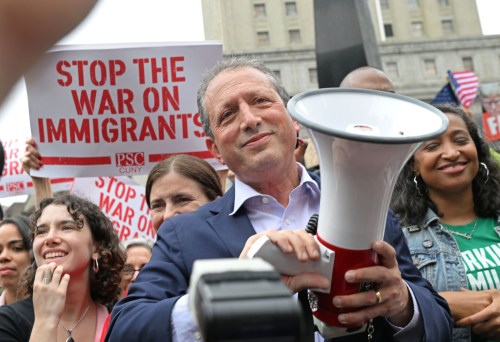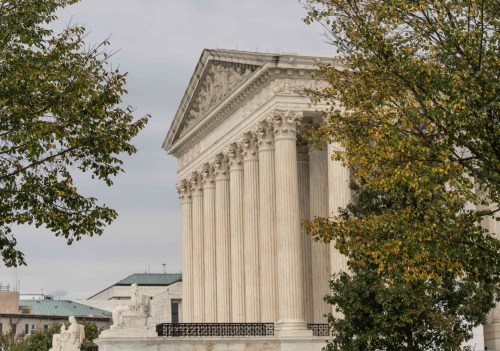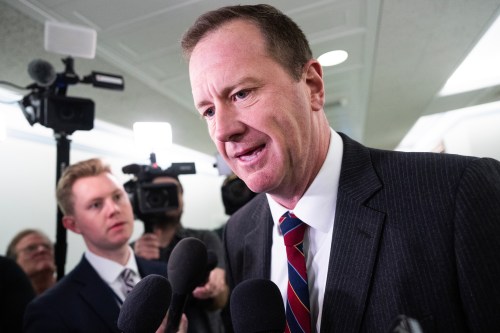You’re reading the free version of The Morning Dispatch. Consider joining as a paid member to get full access to our news, analysis, community comments, and live events.
Happy Thursday! Want to join our team? The Dispatch is looking for a news-obsessed editor to work on TMD. If that’s you—or you know someone who might be a good fit—check out our careers page.
Quick Hits: Today’s Top Stories
- Israel continued to hit targets across Iran on Wednesday, including the police headquarters in Tehran, weapons factories, and centrifuge production sites. Iran kept up its own attacks on cities across Israel with ballistic missiles, though Israel’s preemptive strikes on missile launchers and stockpiles have significantly reduced their frequency. But one Iranian strike hit a Soroka Medical Center—the largest hospital in southern Israel—in Beersheba. The hospital had been evacuated, but the blast injured several people, Israeli officials said. Israeli Defense Minister Israel Katz threatened to step up attacks on “strategic targets” in Iran in response.
- Iranian Supreme Leader Ali Khamenei on Wednesday said that the U.S. would suffer “irreparable damage” if it joined the Israeli strikes on Iran, rejecting calls to surrender. The comments came as U.S. President Donald Trump left open the possibility of participating in the military operation against Iran’s nuclear facilities. “I may do it. I may not do it,” Trump said Wednesday when asked about the U.S. joining the strikes.
- The Supreme Court on Wednesday upheld Tennessee’s ban on gender transition treatment for minors in a 6-3 decision. Writing for a majority comprised of the six conservative justices, Chief Justice John Roberts held that the state’s restrictions on certain treatments for transgender minors, including puberty blockers and hormone therapy, did not violate the Equal Protection Clause of the 14th Amendment. The ruling is expected to set a precedent protecting the 26 states with similar laws, as well as Trump’s executive order blocking federal spending on gender-transition treatment for individuals under 19, from legal challenges.
- Members of the British Parliament on Wednesday voted to decriminalize late-term abortions for women in England and Wales, the most significant reform to British abortion law since the 1960s. In a 379-137 vote, the House of Commons voted to ban the prosecution, arrest, or investigation of women who seek an abortion at any stage of their pregnancy. Previously, the U.K. allowed for abortions up to 24 weeks with the consent of two doctors, with some exceptions after that stage. The new law lifts penalties on women who terminate their pregnancies after 24 weeks, but does not prevent the prosecution of medical professionals who assist in the procedures.
- The baby of Adriana Smith, a brain-dead pregnant woman who had been kept alive by ventilators to preserve the life of her child, was delivered Friday via emergency Caesarean section at Atlanta’s Emory University Hospital. The baby is currently in the neonatal intensive care unit and is expected to “be OK,” Smith’s mother said. Smith—who, nine weeks into her pregnancy, was admitted to the hospital after developing blood clots in her brain—was kept on life support by doctors who said they were required to do so under Georgia’s six-week ban on abortions, sparking widespread public attention. Georgia’s attorney general has disputed the claims, saying that the state’s law does not require a brain-dead patient to be kept on life support.
- U.S. Federal Reserve officials on Wednesday voted to hold interest rates steady, but noted that they expected multiple cuts before the year’s end. In a unanimous decision, the Federal Open Market Committee chose to keep interest rates at 4.25-4.5 percent. The officials also released new economic projections predicting slower growth, increased inflation, and higher unemployment for this year.
Your Personal Info Is Out There — Incogni Helps Wipe It Clean

An Immigration U-Turn—or Not

For a moment last week, it looked like the Trump administration might be backing off from its immigration crackdown. “Our great Farmers and people in the Hotel and Leisure business have been stating that our very aggressive policy on immigration is taking very good, long time workers away from them, with those jobs being almost impossible to replace,” President Donald Trump said on Truth Social last Thursday. The same day, Immigration and Customs Enforcement (ICE) officials received guidance directing agents to pause work site enforcement in the agricultural industry, hotels, and restaurants.
But the pause was short-lived. By early this week, officials reversed the updated guidance and Trump himself announced what seemed to be an expansion of immigration enforcement. And in a sign that the administration wasn’t softening its aggressive enforcement posture, federal agents on Tuesday arrested New York City Comptroller and Democratic mayoral candidate Brad Lander for allegedly obstructing the arrest of a migrant in an immigration courthouse.
Still, the Trump administration has a long road ahead to reach its lofty end-of-year deportation goals—and it faces internal problems including an ICE cash shortage, rising arrest quotas, and limited detention facilities. But with additional funding from Congress likely on the way soon, the administration appears fully committed to its plan.
As a non-paying reader, you are receiving a truncated version of The Morning Dispatch. You can read our full item on immigration enforcement in the members-only version of TMD.
“At the end of the day, this administration wants to deport as many people as possible, and they’re doing everything in their power to make that happen,” David J. Bier, director of immigration studies at the Cato Institute, told TMD. “There’s very little that motivates them other than arrests and deportations, and the economic costs are something that President Trump himself personally has a little bit of interest in, but not compared to the promises he made during his campaign.”
The economic incentives of slowing down deportations seemed to have briefly won out last Thursday, as Trump announced the work site enforcement pause. According to reports, Agriculture Secretary Brooke Rollins had called the president the day before to voice concerns about how the aggressive targeting of work sites was hurting farmers who relied on immigrant laborers. The call persuaded Trump—momentarily. According to a report by Axios, the U-turn upset White House deputy chief of staff Stephen Miller and Homeland Security Secretary Kristi Noem, and it was only a few days before the guidance shifted back. Over the weekend, Noem sent a letter to ICE leadership calling on it to “dramatically intensify arrest and removal operations nationwide.”
On Sunday, Trump announced that immigration enforcement would, in fact, be ramping up—but singled out Democrat-run cities for what he described as the “single largest Mass Deportation Program in History” in a post on Truth Social. “These, and other such Cities, are the core of the Democrat Power Center, where they use Illegal Aliens to expand their Voter Base, cheat in Elections, and grow the Welfare State.”
Despite the fiery language, it is not yet clear whether the announcement amounts to a substantive policy shift. “I don’t think it will change much,” Bier said. “It’s basically a way to sell this to Trump, to kind of get him to ignore the economics and focus on, ‘Look, this is the politics. This is the political win.’ He’s very attuned to that.”
But the economic issues could become more of a problem down the line, particularly as border crossings plummet. “There is really nowhere else to look for potential people to deport unless they are willing to go into workplaces, on farms, and in restaurants to try to find folks,” Kristie De Peña, senior vice president for policy and director of immigration policy at the Niskanen Center, told TMD. As more and more businesses lose workers, there could be downstream economic effects, especially in red states.
“It’s much easier for them to say publicly, ‘We’re going to go after Democratic blue cities,’” De Peña said, “when what we actually know is happening is that they are going into red states, rural farms, rural manufacturing plants where they employ a large portion of these mid-size or small towns and cities, and they’re rounding up people that these towns and cities rely on for a lot of these jobs and services.” The policy could even spark quiet Republican backlash.
Yet enforcement efforts continue to expand. Miller ordered ICE officials to increase their arrest quota from 1,000 to 3,000 arrests per day, reportedly telling agents to focus on rounding up any illegal immigrants—not just those with criminal histories or gang affiliations. And the ambitious new quota has forced officials to come up with new strategies: Workplace raids have increased, sparking protests in Los Angeles and other cities across the country. ICE has also targeted courthouses, arresting migrants who arrive for immigration hearings.
In another strategy to limit immigration, the Trump administration implemented a travel ban on 12 countries, including Iran, Haiti, and Libya. The ban is for both national security reasons and to prevent people from coming into the country and overstaying, according to the administration. And the White House is reportedly weighing adding 36 more countries to the list if they do not take steps to address their nationals in the U.S. illegally.
But ICE itself may not have the bandwidth for widespread enforcement expansion—at least, not right now. The agency is currently $1 billion over budget, and with more than three months left in the fiscal year, it could run out of money next month. Trump could declare a national emergency and divert funds from other agencies, but the easiest solution would be for Congress to pass the reconciliation bill, which would provide ICE with more than $75 billion in additional funding over the next five years.
“I don’t see any changes on the horizon other than onward and upward when the money comes in,” Bier said. “The reason why they have this huge deficit is that they’re feeling so confident that they’re going to get this money from Congress, so they are spending ahead, banking on getting money to bail them out.”
And resources are beginning to run thin. As of late April, the Trump administration had arrested more than 151,000 illegal immigrants. More than 48,000 of them are currently being held in detention facilities, putting the centers close to max capacity. The administration is planning to increase the number of illegal immigrants sent to Guantánamo Bay to alleviate fears of overcrowding, but with arrest quotas now at 3,000 a day, it is likely to be a continuing problem—particularly if deportations slow down but arrests do not.
“The folks that are getting picked up in some of these worksite enforcement efforts are still going through a lot of legal process,” De Peña said. “So it’s not like they are just rounded up and then taken to the border and turned around. The question is, how quickly can they build new detention facilities? How quickly can they stand up more of a judicial apparatus to move these cases through the process?”
That judicial apparatus also poses challenges for removing large numbers of immigrants from the United States. George Fishman, a senior legal fellow at the Center for Immigration Studies, told TMD that it would take an extremely long time to go through the current backlog of immigration cases—and that’s before factoring in these new detainees.
“I’m not necessarily sure it’s logistically, procedurally, practically possible to remove millions and millions of removable aliens through the normal removal process, which is presumably one of the reasons why the president has sought to use the Alien Enemies Act in certain cases to get around the Title 8 removal proceedings,” Fishman said, referring to a 1798 law that allows the president to imprison and deport noncitizens in wartime. In May, the Supreme Court blocked the administration’s attempt to deport Venezuelan nationals under the act, sending the issue back to an appeals court.
Whether the obstacles will be enough to slow down the administration’s massive immigration crackdown in the long term remains to be seen. “I do think that the economics of the situation and these increased workplace raids may start to turn that tide a little bit,” De Peña said. “But I don’t think that it’s broken through just yet.”
Today’s Must-Read
A few weeks after starting his second White House term, President Donald Trump welcomed Tucker Carlson and Elon Musk to the Oval Office. Trump’s two key allies, the centibillionaire and the pundit, donned oversized Make America Great Again hats and posed for a photo with the president on a walk outside the West Wing. As the camera snapped, each man was sporting a signature Trumpian thumbs-up, with Carlson seeming to be caught in the middle of his signature cackle. No one’s laughing now. Less than two weeks after his public and vicious falling out with former special-government employee Musk, Trump is engaging in a war of words with Carlson over the war between Israel and Iran.
Toeing the Company Line
Sideways
The many political pitfalls of attacking Iran.
Why We Care About Israel
Simply put, our ally is in danger.
Yes, Trump Just Nationalized U.S. Steel
At least by the United States’ own standards.
How Long Will the Border Stay Quiet?
Tighter enforcement and asylum restrictions evident in lower numbers of border crossings under Trump.
‘Radical Chic’ Is a Losing Strategy for Democrats
Do these guys even remember how politics is supposed to work?
Court Upholds Tennessee’s Ban on Certain Medical Treatments for Transgender Minors
The court rejected the argument that Tennessee’s ban violated the right to equal protection.
DOGE’s Legacy Up for Votes in Congress
The Senate prepares to dig into a package of cuts to global health and public broadcasting.
Classically Understood
Academia flies south.
Skrmetti and Certiorari
Say it three times fast.
Worth Your Time
New York Times reporter Dan Barry profiled Scott Flansburg, a native of Herkimer, New York, who’s on a quest to right a great historical wrong: James Naismith’s (allegedly) fraudulent claim to have invented basketball in 1891. It’s a hilarious story, and a poignant profile of an old town pining for its glory days. “His case goes like this: Basketball was invented not by Dr. James Naismith in Springfield, Mass., in 1891, as everyone is taught, but by a Herkimer teenager who came up with the idea first, about a year earlier, while tossing heads of cabbage into a basket. Before you say, ‘Check, please,’ know that this stocky, white-haired heretic isn’t some random Herkimer eccentric; he is the Human Calculator, also known as Scott Flansburg, who has astonished people around the world with his ability to add, subtract, multiply and divide vast numbers with finger-snap speed,” Barry wrote. “But Mr. Flansburg has set aside his wizardry to champion what he argues is his hometown’s rightful place in sports history, and he says he has receipts — well, some receipts. He has assembled a group of local leaders and created the nonprofit Herkimer 9 Foundation, dedicated to an admittedly improbable pursuit: to revitalize this town with a basketball-related museum, a basketball-related events center and even a pavilion topped with the world’s largest basketball.”
Presented Without Comment
Times of Israel: Iran TV Broadcasts Apparently Hacked With Calls on Public To Rise Up
Also Presented Without Comment
New York Times: ‘Any Illegal Immigrants?’ Trump Questions Workers at the White House
In the Zeitgeist
The first trailer for 20th Century Studios’ forthcoming biopic on Bruce Springsteen dropped Monday, and we’re already sold. Set to hit theaters in October, Deliver Me From Nowhere will feature Jeremy Allen White as Springsteen, capturing the period when the rock star was recording his iconic 1982 album Nebraska.
Let Us Know
Whose life would you like to see memorialized in a biopic?




















Please note that we at The Dispatch hold ourselves, our work, and our commenters to a higher standard than other places on the internet. We welcome comments that foster genuine debate or discussion—including comments critical of us or our work—but responses that include ad hominem attacks on fellow Dispatch members or are intended to stoke fear and anger may be moderated.
With your membership, you only have the ability to comment on The Morning Dispatch articles. Consider upgrading to join the conversation everywhere.